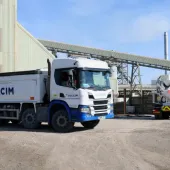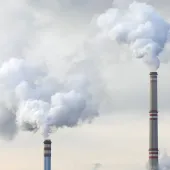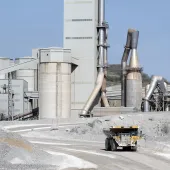Aggregate Industries bring new carbon removal technology to London
Aggregate Industries is to introduce a groundbreaking new technology to the UK that removes carbon from the atmosphere and locks it into recycled concrete.
The building materials supplier, part of the global Holcim Group, has partnered with neustark to set up a mineralisation plant in London - the first venture into the UK market for the Swiss cleantech start-up which has 19 sites in Europe to date.
Neustark technology helps turn this waste into a carbon sink - permanently locking carbon removed from the atmosphere into processed concrete, creating crucial negative emissions.
The technology works by taking concrete from demolished buildings which is crushed and screened at an AIUK recycling site. It then undergoes a procedure in which CO2, captured from biogas plants, is liquified and injected into the concrete granules.
This triggers a mineralisation process which permanently locks the captured carbon into the granules and can then be used to make new concrete with the recycled content inside or other building materials.
So far neustark has permanently removed more than 2,500 tonnes of carbon since it launched commercially in 2023, with an aim of removing one million tonnes by 2030.
Holcim invested in neustark last year and is collaborating with it to deploy their innovative solution at its sites worldwide, scaling up low-carbon and circular construction to multiple sites. The partnership won the 2023 Deloitte “Technology Fast 50” Venture Client Award for outstanding collaborations between startups and large companies.
Lee Sleight, chief executive officer of Aggregate Industries UK, said: “We are really excited to be introducing neustark into the UK as part of our aim to decarbonise our own operations and the wider industry.
“This takes the battle to reduce carbon emissions to the next level through carbonation. The technology is available now and works - it can make a difference now not in five years time.
“We have London - as one of the world’s largest urban mines - with direct access to demolished concrete from building projects and we have the neustark technology. Together we can remove carbon from the atmosphere and permanently lock it into recycled concrete which can then go on to be used again in new building projects.
“This isn’t just a great carbon removal innovation but a great circular economy innovation where we are taking what was once a waste stream and reusing it, saving us from digging up virgin materials in the first place.
“Once fully operational, we are sure that there will be plenty of like minded contractors and specifiers out there who want to further their own decarbonisation journey with us and we see this technology scaling up and delivering results very quickly. Together we can really drive towards our net zero ambitions.”
Valentin Gutknecht, co-founder and CEO of neustark said: “Neustark and Holcim have been working together almost since the founding of neustark five years ago. In that short timeframe, we tested and trialed the solution at lab and pilot scale, launched our first site in Switzerland, and are now our first in the UK. This is testament that a partnership between a cleantech scale-up and a global leader in building solutions can create tangible climate impact, today.
“One million tonnes of CO₂ durably removed from the atmosphere in 2030 – that’s our ambition. We’re already well under way towards the megaton goal. Our strategic partnership with Holcim represents a significant part of this roadmap. It will be a true catalyst to further scale up the permanent carbon removal impact that we generate in the next few years.”
A first small-scale mobile plant is now in operation in Greenwich, and it will start removing hundreds of tonnes of CO2 in the coming months. A large-scale site is set to be installed in the first half of 2025 with a capacity of removing 1,000 tonnes of CO2 per year (net).
As well as the introduction of neustark to the UK, Aggregate Industries is also looking to decarbonise its wider operations including at its Cauldon Cement Plant where it is planning to capture carbon emissions from site and pipe them to permanent storage in disused gas fields underneath the eastern Irish Sea.







